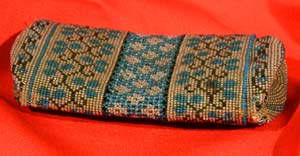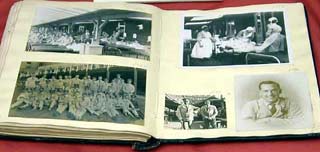Supporting the Troops
Until the nineteenth century the traditional role of women in support of the fighting forces had been that of camp followers, women of uncertain reputation who were part of the baggage train to 'comfort' the troops, but not to care for them in any official capacity or organised fashion.
Methods of caring for the injured in battle were haphazard until the mid-nineteenth century when the International Red Cross was formed in 1863 as a result of Henri Dunant's response to the carnage at the Battle of Solferino in Italy in 1859. Six years earlier Miss Florence Nightingale had been allowed to establish the first corps of trained female nurses at Scutari in reaction to the dreadful conditions in the hospitals serving the Crimean War.
Letter from [Henry Pelham-Clinton] 5th Duke of Newcastle under Lyne, Downing Street, London, to [Stratford Canning] 1st Viscount Stratford de Radcliffe; 19 Oct. 1854 (Ne C 10442)
You will receive by this Mail a letter from Sydney Herbert respecting a corps of Hospital Nurses which has been organised under our auspices by a most ex[cellent]t & able lady Miss Nightingale no rambly philanthropist hunting out her way to usefulness but one whose head as well as heart is thoroughly in her work

Bead case for spectacles belonging to one of the nurses serving in the Crimea (Acc 139)

Return by [Dr Andrew Smith] regarding the casualties and strength of the British army in the East, c.25 Nov. 1854 (Ne C 10447/2). The total number of dead and injured is given as 10,002.
The nursing services during the First and Second World Wars, at home and abroad, employed both trained nurses and voluntary workers to cope with the numbers of injured servicemen flooding into both peacetime and special wartime hospitals.
Many young women who would not have been expected to do rough housework at home or witness any unpleasant sights, such as severe wounds, volunteered to join the services or the Red Cross and had to undertake tasks that would have horrified their parents.

Album of photographs taken at Nottingham hospitals during the First World War (Uhg Ph 2/3)
A photograph album belonging to Sister Gertrude Valentina Hare, Housekeeping and Ward Sister at Nottingham General Hospital and Ward Sister of the Terraced Huts for Wounded Soldiers during the First World War. The photographs are of the nurses and patients, with lists of the patients and their regiments.
One of the photographs from the album, showing nurses and wounded soldiers
For those unable to contribute by nursing, there were numerous opportunities to undertake voluntary work, such as knitting socks and gloves for the forces or sending them comfort parcels and letters.
First World War Red Cross Service Medal (Private collection)
Medal awarded to Mrs Ada Hancock of Holmewood, Derbyshire in recognition of her work for the Red Cross on the home front during the First World War.
Mrs Hancock, a miner's wife, with a group of friends, worked at home in the evenings sewing pyjamas for wounded soldiers at the end of their normal day's work.
Next: Women on the Front Line